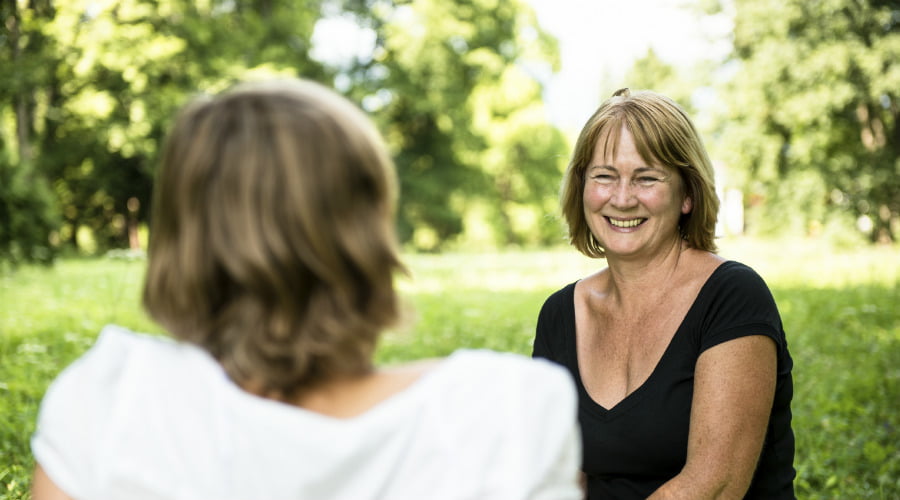Let’s talk about the menopause. We really need to! We have a series of guest blogs on the menopause, from women brave enough to share their experiences and doctors and researchers explaining some evidence on treatments. Read on to find out more.
Blog last updated: 03 August 2022.
It’s unthinkable that we wouldn’t tell girls about menstruation, yet this other stage in women’s lives is not freely discussed and women are arriving at it unprepared.
This isn’t so in all cultures and in those where aging conveys status, the menopause is often treated rather differently. Louise Foxcroft has noted, in her excellent book on the modern menopause, that modern Jewish Orthodox practice has begun to address the silence, with women themselves leading the change and creating new rituals. But for the average Luton Linda or Scarborough Susan, there’s a silence about the menopause – and it isn’t helpful.

For one thing, it’s a taboo that’s preventing women from getting reliable information to help them manage the changes that come with the menopause and to make choices about treatments that might help with the symptoms that many experience. I’ve seen articles in women’s magazines that have been incredibly coy about the whole business. They’ve talked about mood swings but didn’t want to use the ‘M’ word and there was a distinct lack of information about what might actually help.
The blogs
Much more helpful is the wonderful menopause section of the Healthtalk.org website, where you can watch interviews with women talking about their experiences. The senior researcher on this project, Jenny Hislop, tells us more in the first of our guest blogs: Let’s talk about the menopause.
This project helped tackle a taboo that left senior nurse Anne Cooper, who had successfully managed type 1 diabetes for 35 years, unprepared for the impact the menopause would have on her blood glucose levels, along with memory problems that made her think she was losing her grip. “Why didn’t they tell me?” she asks, in her blog: Menopause and type 1 diabetes: why didn’t they tell me?
June Girvin knows a thing or two about reliable information, but struggled to find any to help her when she found herself dealing with menopausal symptoms which went beyond her understanding of what to expect. At the time of writing, June was a senior nurse and Professor at the Faculty of Health and Life Science at Oxford Brookes University. Like Anne, she laments that ‘No-One Told Me’ and is speaking out in a bid to change this for others. You can read June’s blog here: Everything I needed to know about the menopause… No One Told Me.
Martin Hirsch and Stuart Spencer also blogged for us about HRT: Hormone Therapy for the Menopause after Endometriosis Surgery – Friend or Foe? Martin and Stuart are doctors who do research in endometriosis alongside clinical practice. They explain what endometriosis is, what can be done about it, and what we know about HRT for women experiencing the menopause after surgery for endometriosis.
Finally, we look at sex and the menopause. Physiotherapist and comedian Elaine Miller tackled that double taboo and tells us that, while “what most people need is a good listening to”, there is help for menopausal changes which may threaten to ruin a satisfying sex life. Communication and reliable information are key. Read her blog: No sex please, we’re menopausal!
Evidence to help people make decisions about health
Providing people with the best available information to help them make decisions about health, whether that’s treatmentSomething done with the aim of improving health or relieving suffering. For example, medicines, surgery, psychological and physical therapies, diet and exercise changes., screening or lifestyle choices, is what we’re about at Cochrane. Cochrane ReviewsCochrane Reviews are systematic reviews. In systematic reviews we search for and summarize studies that answer a specific research question (e.g. is paracetamol effective and safe for treating back pain?). The studies are identified, assessed, and summarized by using a systematic and predefined approach. They inform recommendations for healthcare and research. gather the best evidence addressing a particular question, like ‘can exercise reduce menopausal hot flushes?’. There might be enough evidence to answer that; it might show that there are both risks and benefits that need to be weighed up. It might show that we still don’t know, that there are gaps in research, and this can help prompt future research studies. Like the Cochrane Review looking at exercise for hot flushes, which found only one small trialClinical trials are research studies involving people who use healthcare services. They often compare a new or different treatment with the best treatment currently available. This is to test whether the new or different treatment is safe, effective and any better than what is currently used. No matter how promising a new treatment may appear during tests in a laboratory, it must go through clinical trials before its benefits and risks can really be known.. Not enough evidence to say whether exercise has any effect.
We need to break down the menopause taboo
If women are going to get support and reliable information and if important gaps in our knowledge are to be addressed by new research, we need to break down the taboo. Talking is the first action in Menopause Support‘s campaign. Suffolk GP Hannah Short and a nurse, Natasha North, explain:
“Menopause Support is an advocacy network that works to improve health and care for women affected by menopause. We think that it doesn’t get talked about nearly enough, and often when it does it quickly becomes a controversial topic… Women and health professionals need clear, unbiased information so that they can make informed decisions together about how to manage the menopause.
Our #ChangeTheChange campaign was one of four grassroots campaigns being featured as part of the 2015 NHS Change Day, which is a call to action. We’re asking people to take three actions:
- Get together (join a new online forum to connect and inspire people working to improve menopause health and care)
- Get the facts (access new and up-to-date information about menopause)
- Get menopause on the agenda (commit to discussing it at team, directorate or board meetings)”
It really is time to start talking and see what we can change.
Resources on menopause
The Editors have added these in April 2022. With thanks to @drhannahshort, GP Specialist in Menopause & Premenstrual Disorders, for her suggestions.
- You can find our other blogs on menopause here.
- Balance: Founded by Dr Louise Newson, “a GP and Menopause Specialist who works to increase awareness and knowledge of the perimenopause and menopause, and campaigns for better menopause care for all women”.
- British Menopause Society: tools for clinicians and Menopause Care Resources Toolkit
- Daisy Network, a charity providing information and support to women with Premature Ovarian Insufficiency, also known as Premature Menopause.
- European Society of Human Reproduction and Embryology – Guideline on the management of premature ovarian insufficiency.
- Global Menopause Inclusion Collective
- Healthtalk – Menopause. Here you can see videos of women in the UK talking about their menopause experiences.
- International AssociationA relationship between two characteristics, such that as one changes, the other changes in a predictable way. For example, statistics demonstrate that there is an association between smoking and lung cancer. In a positive association, one quantity increases as the other one increases (as with smoking and lung cancer). In a negative association, an increase in one quantity corresponds to a decrease in the other. Association does not necessarily mean that one thing causes the other. for Premenstrual Disorders: Surgery and surgical menopause for premenstrual disorders.
- Rock My Menopause (created on behalf of the Primary Care Women’s Health Forum)
- NICE guideline – Menopause: diagnosis and management.
- NHS – Menopause
- Women’s Health Concern factsheets
Please note, we cannot give specific medical advice and do not publish comments that link to individual pages requesting donations or to commercial sites, or appear to endorse commercial products. We welcome diverse views and encourage discussion but we ask that comments are respectful and reserve the right to not publish any we consider offensive. Cochrane UK does not fact check – or endorse – readers’ comments, including any treatments mentioned.



[…] jogged my memory once we have been speaking about this collection. @SarahChapman30 over on the Evidently Cochrane blogs, ran a collection first revealed in 2015, and final up to date in 2022, taking a look at completely […]
[…] my woodland cousin reminded me when we were talking about this series. @SarahChapman30 over at the Evidently Cochrane blogs, ran a series first published in 2015, and last updated in 2022, looking at different experiences […]
[…] jogged my memory once we had been speaking about this collection. @SarahChapman30 over on the Evidently Cochrane blogs, ran a collection first printed in 2015, and final up to date in 2022, totally different […]
[…] my woodland cousin reminded me when we were talking about this series. @SarahChapman30 over at the Evidently Cochrane blogs, ran a series first published in 2015, and last updated in 2022, looking at different experiences […]
[…] my woodland cousin reminded me when we were talking about this series. @SarahChapman30 over at the Evidently Cochrane blogs, ran a series first published in 2015, and last updated in 2022, looking at different experiences […]
[…] my woodland cousin reminded me when we were talking about this series. @SarahChapman30 over at the Evidently Cochrane blogs, ran a series first published in 2015, and last updated in 2022, looking at different experiences […]
I’ve just published a book on this very issue, written along with a GP. It’s called Making Friends with the Menopause and it was because my own GP failed to link my increased anxiety to perimenopause I became interested in the subject. I’d be very happy to talk/share more as it’s a subject I’m passionate about. http://www.amazon.co.uk/Making-Friends-Menopause-comforting-support-ebook/dp/B00T9XUNXI/ref=sr_1_1?s=books&ie=UTF8&qid=1425218217&sr=1-1&keywords=making+friends+with+the+menopause